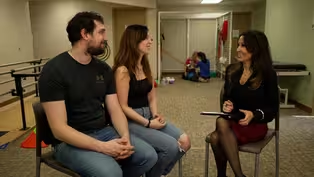Business | Life 360 with Kristi K.
Griffin James Hillabrand Milk and Nutrition Lab
Clip: 11/16/2023 | 7m 32sVideo has Closed Captions
Kristi is at the Russell J. Ebeid Children's Hospital to talk about pediatric innovations.
Kristi visits the ProMedica Russell J. Ebeid Children's Hospital to discuss about pediatric innovation amongst a wide variety of experts within the field. As she heads inside their very own Griffin James Hillabrand Milk and Nutrition Lab, she is given a closer look. From where the formula is stored to knowing the criteria for the baby's needs, Kristi discovers how the entire process works.
Problems playing video? | Closed Captioning Feedback
Problems playing video? | Closed Captioning Feedback
Business | Life 360 with Kristi K. is a local public television program presented by WGTE
Business Life 360 with Kristi K. is made possible in part by KeyBank National Association Trustee for the Walter Terhune Memorial Fund and ProMedica Toledo Hospital, celebrating 150 years of serving our community.
Business | Life 360 with Kristi K.
Griffin James Hillabrand Milk and Nutrition Lab
Clip: 11/16/2023 | 7m 32sVideo has Closed Captions
Kristi visits the ProMedica Russell J. Ebeid Children's Hospital to discuss about pediatric innovation amongst a wide variety of experts within the field. As she heads inside their very own Griffin James Hillabrand Milk and Nutrition Lab, she is given a closer look. From where the formula is stored to knowing the criteria for the baby's needs, Kristi discovers how the entire process works.
Problems playing video? | Closed Captioning Feedback
How to Watch Business | Life 360 with Kristi K.
Business | Life 360 with Kristi K. is available to stream on pbs.org and the free PBS App, available on iPhone, Apple TV, Android TV, Android smartphones, Amazon Fire TV, Amazon Fire Tablet, Roku, Samsung Smart TV, and Vizio.
Providing Support for PBS.org
Learn Moreabout PBS online sponsorshipAnd now let's head out to see what's exciting in the world of pediatric innovation.
I'm Kristie Kaye, and I'm here on location at the Promedica EBI Children's Hospital.
We're talking about pediatric innovations here in our region.
And today we're here at the Griffin James Hillebrand, Milk and Nutrition Lab.
And I'm talking with Dr. Christy Hornick.
Great to be with you today.
It's good to be here.
Give us some details on how this got started.
Dr. Hornick: This started when we realized that our nurses were mixing our breast milk for our premature babies, and moms would come in and bring their breast milk.
And if it wasn't processed in time, then that milk would be wasted for our extremely preterm babies.
An exclusive human milk diet with breast milk provided by moms really increases their chance of survival with decreased adverse events of just being born premature.
Kristi K: And it is not just for those who are in the nick.
It is also for other moms and babies with it.
Correct.
Dr. Hornick: So any baby who is sick, who's admitted to the newborn intensive care unit or the pediatric floor or the pediatric intensive care unit, their mother's milk will be processed here to ensure its safety and also that the supply is maintained.
Kristi K: And what kind of benefits results impact are you seeing as it relates to the moms themselves?
Dr. Hornick: From our perspective, it is actually making sure that our most vulnerable patients get the proper nutrition for our preterm children and our very sick children's.
It is treated as medicine that only mom can provide for their baby.
So it is precious and we just ensure that none of that, hopefully not even a drop, will go to waste and will be able to be given to their babies.
Kristi K: So, Dr. Hornick, tell us how this milk lab is different and more innovative than some of the other ones that we might be finding, whether it's in our region or across.
Dr. Hornick: Like our milk lab is the only or our hospital currently in the Toledo area is the only one that actually provides human milk with additives made from human milk for our extremely vulnerable babies way 1500 grams or less.
Additionally, if babies are failing to grow or they're seeming like they're lacking in nutrition, we now have a specific breast milk analyzer which will allow us to know what components we need to get our babies to thrive.
Kristi K: I'm really looking forward to going in and taking a tour of the milk lab and seeing all these things that you're telling us about.
Dr. Hornick: Yeah, you can see the care that's being given when we're processing the milk, the sterile environment.
However, things carefully planned out and Amanda would be happy to show you around.
Kristi K: Great.
Let's go.
So here in the milk and nutrition lab with Amanda, our milk technician, and she's going to give us some background on what happens here in the lab.
So tell us a little bit more.
And thanks for joining us.
Amanda McGhaha: Yes, absolutely.
So a little bit of an overview is we provide milk prepping services.
So we use breast milk, we use formula.
We've fortified both of those things to certain to meet certain criteria that the babies need.
So it's an individual need basis and we can do that in a clean environment for all the babies that we have here in the McEwen and pediatric units.
Kristi K: And something that I find really interesting is how you can adapt that her mother and her milk and the baby.
Amanda McGhaha: Absolutely.
So every mom, you know, that comes breast milk comes in here.
We track everything to that mom and that baby.
And then you can use whatever formulas or powders to make it specific for that baby's needs, and then they can change it on a day to day a half, day, an hourly basis to adjust for that changing growth and needs for the babies here.
Kristi K: And of course, the moms love it, too, because their milk is tracked and it is the healthiest it could be for her, for the baby.
Yes.
And then also, what do you do once that bottle gets here after the mom has pumped the milk?
Amanda McGhaha: So when mom has come to mouth, everything gets labeled with a barcode for that mom to match that baby.
So we bring it back and we scan that into our system and log in.
When it was pumped, how much was pumped?
And then it stays accounted for in that inventory system throughout the process.
And then we use it.
It is done.
Scan back out to keep an accurate count of what we have and what we're using for moms and babies.
Kristi K: I like the tracking system, too.
Yes, I was at a barcode situation.
Amanda McGhaha: Is it's a2d barcode that every label they print out labels for moms and those go out on the bottles when mom pumps them.
So it's a really nice system for tracking and it keeps very accurate numbers.
Kristi K: So how is this different than before the lab was here, What was happening before?
And then when this opened in April of 2023, how has the system, if you will, really changed for the better?
Amanda McGhaha: So they used to prep bedside, so they go in the beds and prep in the rooms with Mom's breast milk, maybe a couple of feeds just at the bedside on the countertop, in the room with the can stain in the room and everything being used sometimes between separate babies.
So what we did is we took that away from being in the rooms.
We prep everything in a clean environment, so we use hoods that we prep underneath, so it flows down to keep anything from entering into that hood space, keeps everything a lot cleaner.
Everything is stored in the clean room once we open it so that it doesn't get back introduced into anything outside of the lab.
Kristi K: What is the process of freezing milk and then thawing milk for the mothers and the babies.
Amanda McGhaha: So we freeze any overproduction that we're not using that day?
We have a lot of freezers.
They are stored alphabetically and with mothers having their own bins for all of their baby's milk.
So it goes in a frozen.
And then if we need to use it the next day, we pull that out and thaw that right before prep.
So once milk is thawed, it only has a 24 hour life shelf life after that that we have to use.
So we do have bead warmers that we use that are like metal beads that are heated, that we place milk into bags and get into those bead warmers to thaw it at a slow pace so that it can get part of the temp at a slower rate.
And we also use other warmers where we place that in a water bag.
So the milk doesn't touch the water, but it's inside a bag where the water is warm to then thaw that milk as well inside of that.
Kristi K: Yeah, this is quite a high tech process.
Amanda McGhaha: Yeah, it's a lot of very nice things that I didn't know existed.
Like I said before I started here, I didn't you know, you do things you never think about that.
You're like, Oh, that would be amazing to have something like that for sure.
Kristi K: And what do you hear from moms in terms of the benefits to them?
Amanda McGhaha: They like knowing that we can track how much milk they're producing.
They like knowing what's going into that process and how much of it we're using at a time.
So they get to see that benefit of growth with the accuracy that we use in prepping that with powders.
And then they get to know what we're using and how we're keeping it here and stored for them properly.
Kristi K: What a great pediatric innovation.
This milk and nutrition lab is phenomenal.
Amanda McGhaha: So absolutely.
Kristi K: Thanks for all you do.
Video has Closed Captions
Clip: 11/16/2023 | 7m 36s | Kristi meets with “Yan Can Cook” host, Chef Martin Yan. (7m 36s)
ProMedica Total Rehab - Spider Cage
Video has Closed Captions
Clip: 11/16/2023 | 7m 57s | Kristi heads to ProMedica Total Rehab where she learns about the spider cage. (7m 57s)
Providing Support for PBS.org
Learn Moreabout PBS online sponsorship
- News and Public Affairs

Top journalists deliver compelling original analysis of the hour's headlines.

- News and Public Affairs

FRONTLINE is investigative journalism that questions, explains and changes our world.












Support for PBS provided by:
Business | Life 360 with Kristi K. is a local public television program presented by WGTE
Business Life 360 with Kristi K. is made possible in part by KeyBank National Association Trustee for the Walter Terhune Memorial Fund and ProMedica Toledo Hospital, celebrating 150 years of serving our community.

